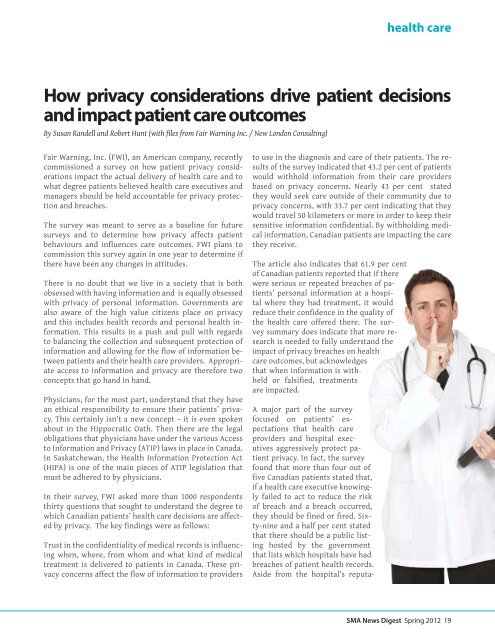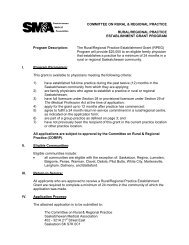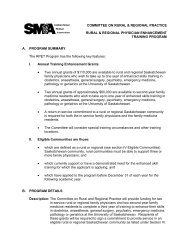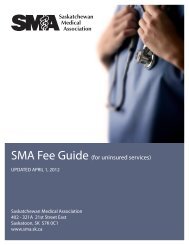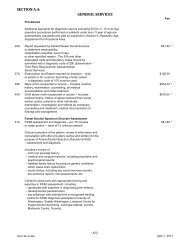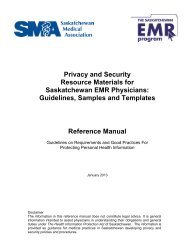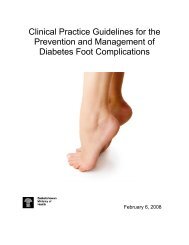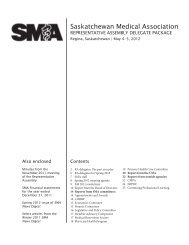Get ready for Clinical Practice Redesign - Saskatchewan Medical ...
Get ready for Clinical Practice Redesign - Saskatchewan Medical ...
Get ready for Clinical Practice Redesign - Saskatchewan Medical ...
You also want an ePaper? Increase the reach of your titles
YUMPU automatically turns print PDFs into web optimized ePapers that Google loves.
health care<br />
How privacy considerations drive patient decisions<br />
and impact patient care outcomes<br />
�������������������������������������������������������������������������������������������<br />
Fair Warning, Inc. (FWI), an American company, recently<br />
commissioned a survey on how patient privacy considerations<br />
impact the actual delivery of health care and to<br />
what degree patients believed health care executives and<br />
managers should be held accountable <strong>for</strong> privacy protection<br />
and breaches.<br />
The survey was meant to serve as a baseline <strong>for</strong> future<br />
surveys and to determine how privacy affects patient<br />
behaviours and influences care outcomes. FWI plans to<br />
commission this survey again in one year to determine if<br />
there have been any changes in attitudes.<br />
There is no doubt that we live in a society that is both<br />
obsessed with having in<strong>for</strong>mation and is equally obsessed<br />
with privacy of personal in<strong>for</strong>mation. Governments are<br />
also aware of the high value citizens place on privacy<br />
and this includes health records and personal health in<strong>for</strong>mation.<br />
This results in a push and pull with regards<br />
to balancing the collection and subsequent protection of<br />
in<strong>for</strong>mation and allowing <strong>for</strong> the flow of in<strong>for</strong>mation between<br />
patients and their health care providers. Appropriate<br />
access to in<strong>for</strong>mation and privacy are there<strong>for</strong>e two<br />
concepts that go hand in hand.<br />
Physicians, <strong>for</strong> the most part, understand that they have<br />
an ethical responsibility to ensure their patients’ privacy.<br />
This certainly isn’t a new concept – it is even spoken<br />
about in the Hippocratic Oath. Then there are the legal<br />
obligations that physicians have under the various Access<br />
to In<strong>for</strong>mation and Privacy (ATIP) laws in place in Canada.<br />
In <strong>Saskatchewan</strong>, the Health In<strong>for</strong>mation Protection Act<br />
(HIPA) is one of the main pieces of ATIP legislation that<br />
must be adhered to by physicians.<br />
In their survey, FWI asked more than 1000 respondents<br />
thirty questions that sought to understand the degree to<br />
which Canadian patients’ health care decisions are affected<br />
by privacy. The key findings were as follows:<br />
Trust in the confidentiality of medical records is influencing<br />
when, where, from whom and what kind of medical<br />
treatment is delivered to patients in Canada. These privacy<br />
concerns affect the flow of in<strong>for</strong>mation to providers<br />
to use in the diagnosis and care of their patients. The results<br />
of the survey indicated that 43.2 per cent of patients<br />
would withhold in<strong>for</strong>mation from their care providers<br />
based on privacy concerns. Nearly 43 per cent stated<br />
they would seek care outside of their community due to<br />
privacy concerns, with 33.7 per cent indicating that they<br />
would travel 50 kilometers or more in order to keep their<br />
sensitive in<strong>for</strong>mation confidential. By withholding medical<br />
in<strong>for</strong>mation, Canadian patients are impacting the care<br />
they receive.<br />
The article also indicates that hat 61.9 per cent<br />
of Canadian patients reported ed that if there<br />
were serious or repeated breaches reaches of patients’<br />
personal in<strong>for</strong>mation n at a hospital<br />
where they had treatment, ent, it would<br />
reduce their confidence in the quality of<br />
the health care offered there. ere. The survey<br />
summary does indicate that more research<br />
is needed to fully understand nderstand the<br />
impact of privacy breaches on health<br />
care outcomes, but acknowledges edges<br />
that when in<strong>for</strong>mation is withheld<br />
or falsified, treatments nts<br />
are impacted.<br />
A major part of the survey ey<br />
focused on patients’ exxpectations<br />
that health care re<br />
providers and hospital exececutives aggressively protect patient<br />
privacy. In fact, the survey urvey<br />
found that more than four out of<br />
five Canadian patients stated ed that,<br />
if a health care executive knowingnowingly failed to act to reduce the he risk<br />
of breach and a breach occurred, curred,<br />
they should be fined or fired. ed. Sixty-nine<br />
and a half per cent stated<br />
that there should be a public lic listing<br />
hosted by the government nment<br />
that lists which hospitals have ave had<br />
breaches of patient health records.<br />
Aside from the hospital’s reputareputa- SMA News Digest Spring 2012 19


